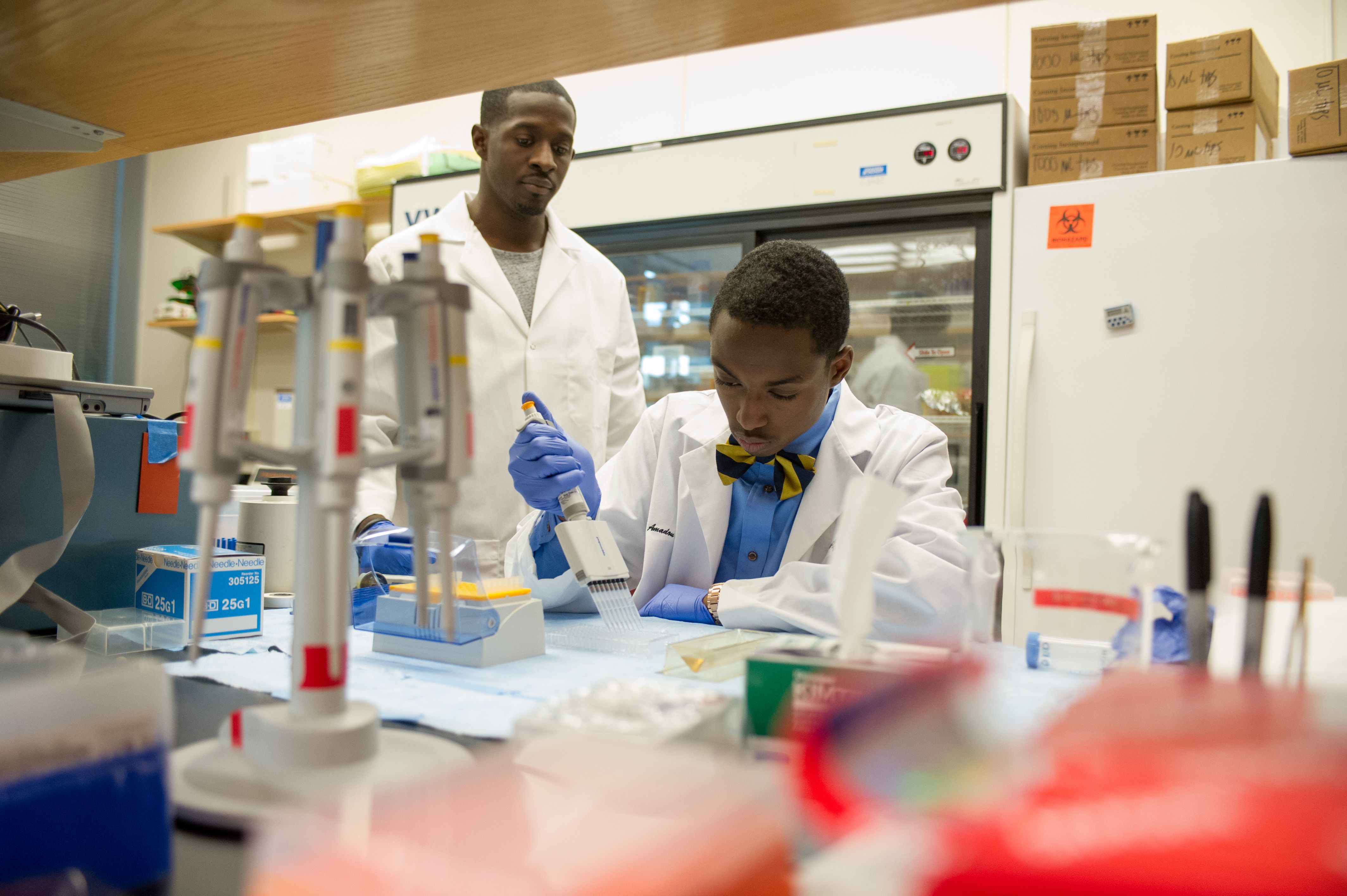
The school’s undergraduate research program provides students with an opportunity to exercise their own initiative and creativity in the laboratory while interacting closely with professors, research scientists, and graduate students. Many undergraduate researchers publish articles or present posters on their experiences. Undergraduates often appear as co-authors on scholarly publications and present their research at scientific meetings. Students interested in research with faculty should consult the research themes page and faculty home pages to learn about research opportunities that are currently available and get background on the activities in a faculty members research group.
Research may be performed for course credit or pay. For students interested in graduate studies and/or a long-term career in research, chemistry and biochemistry students are encouraged to pursue the research option. The relevant research course numbers are: CHEM 2698, 2699, 4698, and 4699.
Undergraduate Research Course Approval is required every semester and must be appproved and submit at least 48 hours before phase II registration closes. Both Chemistry and Biochemistry majors and non-majors should use the Undergraduate Research Permit Request Form on the majors' Canvas site to request a permit.
Georgia Tech undergraduates are encouraged to apply for the President's Undergraduate Research Awards (PURA). These awards provide student salaries and travel expenses for undergraduates to attend and present at professional meetings. Students should also provide a copy of the application to the Academic Programs Office in the School of Chemistry and Biochemistry for consideration for the School Undergraduate Research Scholarship. In addition, the school and college both provide travel awards for undergraduates to support the presentation of their research at regional and national meetings.
For non-Georgia Tech students, the School of Chemistry and Biochemistry offers a 10-week summer undergraduate research program.
Additional Opportunities for Undergraduate Research
The Bagwell Fellowship Program provides funding for undergraduates pursuing research for the first time; click here for presentations from past Bagwell Fellows.
- NSF Research Experience for Undergraduates in Chemistry
- Georgia Tech Undergraduate Research Opportunities
- NASA Lewis' Educational and Research Collaborative Internship Program (LERCIP)
- Undergraduate Internship Program at Georgia Tech
- Undergraduate Materials Research Initiative Fellowships via Materials Research Society
- FBI Honors Internship Program
- Georgia Bureau of Investigation Internship Program
- Centers for Disease Control/ATSDR Internship Programs
- Oak Ridge National Lab and Oak Ridge Associated Universities Summer Research Programs
- Mayo Summer Undergraduate Research Fellowship
- Argonne National Lab
- Lawrence Livermore National Lab
Several Vertically Integrated Projects (VIPs) involve research in chemistry or biochemistry. VIPs involve research with a team of students and faculty potentially spanning the undergraduate and graduate levels. If you are interested in research but would prefer to work on a team, visit vip.gatech.edu or the links below to learn more!
- Accelerating Materials Discovery with AI
- Advanced Graphene Battery Technology
- Big Data and Quantum Mechanics
- Chemical Equity
- STEMComm
Courses
CHEM 2698. Research Assistantship (Pay or Audit) for Freshmen and Sophomores
(Audit Basis)
CHEM 2699. Undergraduate Research for Freshmen and Sophomores (Pass/Fail Basis)
CHEM 4698. Research Assistantship (Pay or Audit) for Juniors and Seniors
(Audit Basis
CHEM 4699. Undergraduate Research for Juniors and Seniors (Letter Grade Basis)
CHEM 2698 or 4698 Credit earned on audit basis (i.e., pay or volunteer basis) does not count toward your degree.
3 Hours in the research lab per week are required for 1 credit of coursework. Students may register for a maximum of 4 credit hours per semester on Letter Grade Basis (CHEM 2699 and CHEM 4699). If additional research hours are desired they may be added on Audit Basis (CHEM 2698 and 4698). The total number of letter-graded 4699 credits allowed across all fields (CHEM, BIOS, BMED, etc.) is 12 per degree.
How to Get Involved
About 25% of our undergraduates are involved in research within the School during any given semester. Here are some tips on getting started.
1. Decide what you who you would like to work with and what you want to do. You should check out the undergraduate projects research page to see what projects are currently available.
2. If you find a project that is interesting, check the faculty research descriptions on the School homepage. Don't worry if you don't understand everything on the web page—it can be very specific to the area of research. Just use it to get a general idea of what the professor does and whether you might be interested.
3. Email the faculty member (research advisor) with the following information:
- A paragraph about why you are interested in joining a research group and more importantly why you are interested in this research project in particular
- A resume
4. If you are invited in for an interview, make a good first impression. Be professional and always err on the side of being too formal. Remember, this is a chemistry interview, so dress properly. Be patient as you might not be chosen for your first interview.
5. Work with your research advisor to craft a title and short description of the project, which will be included with your permit request. Complete and submit the Undergraduate Research Permit Request Form at least 48 hours before the end of Phase II of registration. When you receive a permit, add the appropriate course using the specific CRN (with your research advisor as instructor) indicated in the confirmation email. See Courses above for information about the four undergraduate research courses.